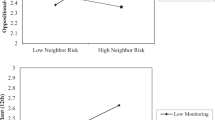Abstract
Objectives
The current study tested the extent to which the neighborhood context influenced Roma youth adjustment (internalizing and externalizing problems, and academic competence) and whether ethnicity moderated these links and explained unique variance.
Methods
Cross-sectional data were collected from 369 Roma and non-Roma early and middle adolescents.
Results
Roma youth reported significantly lower SES, school grades, and academic aspirations. Perceived fear or concerns about neighborhood safety predicted all three internalizing problems, for both Roma and non-Roma adolescents; neighborhood acquaintanceship density and nighttime social activities predicted externalizing behaviors, for both ethnic groups; and finally, both ethnicity and nighttime social activities predicted school grades, while only ethnicity predicted academic aspirations. No significant by ethnicity interaction effects were found.
Conclusions
Roma youth reported lower grades and academic aspirations, but no mean level differences were found in internalizing or externalizing problems by ethnicity. On the other hand, neighborhood variables were important for both groups of youth, and with the exception of measures of academic competence, ethnicity did not explain unique variance. Thus, developmental processes, the links between neighborhood variables and measures of adjustment, were highly similar in Roma and non-Roma youth.
Similar content being viewed by others
References
Assari S, Moazen-Zadeh E, Caldwell CH et al (2017) Racial discrimination during adolescence predicts mental health deterioration in adulthood: gender differences among Blacks. Front Public Health 5:104. https://doi.org/10.3389/fpubh.2017.00104
Buckner JC (1988) The development of an instrument to measure neighborhood cohesion. Am J Community Psychol 16:771–791. https://doi.org/10.1007/BF00930892
Cave L, Cooper MN, Zubrick SR et al (2020) Racial discrimination and child and adolescent health in longitudinal studies: a systematic review. Soc Sci Med 250:112864
Dimitrova R, Chasiotis A, Bender M et al (2013) Collective identity and wellbeing of Roma minority adolescents in Bulgaria. Int J Psychol 48:501–513. https://doi.org/10.1080/00207594.2012.682064
Dimitrova R, Buzea C, Taušová J et al (2017) Relationships between identity domains and life satisfaction in minority and majority youth in Albania, Bulgaria, Czech Republic, Kosovo, and Romania. Eur J Dev Psychol 15:61–82. https://doi.org/10.1080/17405629.2017.1336997
Ergo Network (2019) Towards a more holistic approach to Roma inclusion in the EU: stronger policy mainstreaming and focus. http://ergonetwork.org/2019/06/towards-a-more-holistic-approach-to-roma-inclusion/
European Commission (2019) Communication from the commission to the European parliament and the council: report on the implementation of national Roma integration strategies
European Union Agency for Fundamental Rights (2014) Roma survey-data in focus: poverty and employment of Roma in 11 EU member states. Publications Office of the European Union, Luxembourg. https://doi.org/10.2811/50875
European Union Agency for Fundamental Rights (2016) Second European Union minorities and discrimination survey: Roma—selected findings. Publications Office of the European Union, Luxembourg. https://doi.org/10.2811/469
Freudenburg WR (1986) The density of acquaintanceship: an overlooked variable in community research? Am J Sociol 92:27–63. https://doi.org/10.1086/228462
Gatenio Gabel S (2009) The growing divide: the marginalisation of young Roma children in Bulgaria. Int J Soc Welf 18:65–75
Gerevich J, Bacskai E, Czobor P, Szabo J (2010) Substance use in Roma and non-Roma adolescents. J Nerv Ment Dis 198:432–436. https://doi.org/10.1097/NMD.0b013e3181e07d51
Hammarberg T (2011) European media and anti-Gypsy stereotypes. https://www.coe.int/en/web/commissioner/-/european-media-and-anti-gypsy-stereotyp-1. Accessed 16 June 2020
Kolarcik P, Geckova MA, Reijneveld SA et al (2012) Social support, hopelessness and life satisfaction among Roma and non-Roma adolescents in Slovakia. Int J Public Health 57:905–913. https://doi.org/10.1007/s00038-012-0413-6
Kolarcik P, Madarasova Geckova A, Reijneveld SA, van Dijk JP (2016) Delinquent and aggressive behavior and social desirability among Roma and non-Roma adolescents in Slovakia: a cross-sectional study. J Interpers Violence 31:677–693. https://doi.org/10.1177/0886260514556103
Lee EJ, Keyes K, Bitfoi A et al (2014) Mental health disparities between Roma and non-Roma children in Romania and Bulgaria. BioMed Central 14:297
Naydenova V, Matarazzo M (2019). Post-2020 EU Roma strategy: the way forward. Open Society Foundations. https://www.opensocietyfoundations.org/publications/post-2020-eu-roma-strategy-the-way-forward
O’Higgins and Brüggerman (2014) The consequences of cumulative discrimination: how special schooling influences employment and wages of Roma in the Czech Republic. Eur Educ Res J 13:282–294. https://doi.org/10.2304/eerj.2014.13.3.282
Papazova E, Antonova R (2012) Problem behavior in different social environments among adolescents of Bulgarian and Roma origin. Cogn Brain Behav Interdiscipl J 16:89–105
Phiren Amenca (2019). Position paper of the Roma youth networks on the post 2020 EU framework for national Roma integration strategies. https://phirenamenca.eu/position-paper-of-the-roma-youth-networks-on-the-post-2020-eu-framework-for-national-roma-integration-strategies/
Russell ST, Sinclair KO, Poteat VP, Koenig BW (2012) Adolescent health and harassment based on discriminatory bias. Am J Public Health 102(3):493–495. https://doi.org/10.2105/AJPH.2011.300430
Sigona B (2005) Locating ‘the Gypsy problem’. The Roma in Italy: stereotyping, labelling and ‘nomad camps’. J Ethn Migr Stud 31:741–756. https://doi.org/10.1080/13691830500109969
Vazsonyi AT, Pickering LE, Junger M et al (2001) An empirical test of a general theory of crime: a four-nation comparative study of self-control and the prediction of deviance. J Res Crime Delinq 38:91–131. https://doi.org/10.1177/0022427801038002001
Vazsonyi AT, Pickering LE, Belliston LM, Hessing D, Junger M (2002) Routine activities and deviant behaviors: American, Dutch, Hungarian, and Swiss youth. J Quant Criminol 18:397–422. https://doi.org/10.1023/A:1021121727676
Vazsonyi AT, Cleveland HH, Wiebe RP (2006) Does the effect of impulsivity on delinquency vary by level of neighborhood disadvantage? Crim Just Behav 33:511–541. https://doi.org/10.1177/0093854806287318
Vazsonyi AT, Jiskrova GK, Ksinan AJ, Blatný M (2016) An empirical test of self-control theory in Roma adolescents. J of Crim Just 44:66–76. https://doi.org/10.1016/j.jcrimjus.2015.12.004
Weinberger DA, Schwartz GE (1990) Distress and restraint as superordinate dimensions of self-reported adjustment: a typological perspective. J Pers 58:381–417. https://doi.org/10.1111/j.1467-6494.1990.tb00235.x
Weinerová R (2014) Anti-gypsyism in the Czech Republic: Czechs’ perception of Roma in cultural stereotypes. Acta Ethnogr Hung 55:211–221. https://doi.org/10.1556/AEthn.59.2014.1.10
Zimmerman GM, Botchkovar EV, Antonaccio O, Hughes LA (2015) Low self-control in “bad” neighborhoods: assessing the role of context on the relationship between self-control and crime. Just Q 32:56–84. https://doi.org/10.1080/07418825.2012.737472
Acknowledgements
We would like to thank all the school administrators and students for their participation as well as Drs. Terezie Pilátová Osecká and Veronika Sobotková for their local assistance in collecting part of these data. Data collection was supported in part by a Fulbright-Masaryk Distinguished Chair fellowship to the first author.
Author information
Authors and Affiliations
Corresponding author
Ethics declarations
Conflict of interest
On behalf of all authors, the corresponding author states that there is no conflict of interest.
Ethical approval and Informed consent
All procedures performed in studies involving human participants were in accordance with the ethical standards of the institutional and/or national research committee (Auburn University Institutional Review Board, # 10-356EP1105; Ethics Committee, Czech Academy of Sciences) and with the 1964 Helsinki Declaration and its later amendments or comparable ethical standards, which included obtaining informed consent from parents/legally authorized representatives.
Additional information
Publisher's Note
Springer Nature remains neutral with regard to jurisdictional claims in published maps and institutional affiliations.
This article is part of the special issue “Adolescent Health in Central and Eastern Europe”.
Rights and permissions
About this article
Cite this article
Vazsonyi, A.T., Liu, D., Beier, J. et al. Neighborhood effects on internalizing and externalizing problems, and academic competence: a comparison of Roma and non-Roma adolescents. Int J Public Health 65, 1383–1392 (2020). https://doi.org/10.1007/s00038-020-01425-z
Received:
Revised:
Accepted:
Published:
Issue Date:
DOI: https://doi.org/10.1007/s00038-020-01425-z




